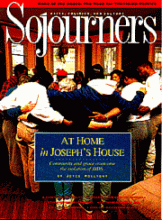If you sometimes feel, as the Hebrew prophets Elijah and Jonah did, like going into a barren place, lying down under a tree, and saying, "I have had enough Lord....I want to die," Sharon Welch's A Feminist Ethic of Risk is for you. This insightful book calls middle-class Euro-American peoples who are engaged in the struggle for justice and peace to conversion from "cultured despair."
Welch--feminist liberation theologian and professor at Harvard Divinity School--diagnoses the roots of this problem in a broad-based political, philosophical, and theological "ethic of control." In counterpoint to such a deformative ethic, she proposes an alternative "ethic of risk," drawn from the example and stories of African-American women.
In the first of three sections of the book, Welch challenges the equating of good or responsible action with the ability to take decisive and effective measures to carry out one's intentions. It is no surprise that this win-lose mentality is foundational to American national security policy with its quest for absolute invulnerabilty through nuclear strategy. It also informs moral and political philosophy, evidenced by Reagan's unquestioning confidence in the moral superiority of the "American way" (and Bush's further championship of the "new world order").
However, Welch's greatest wisdom lies in her exposure of the way non-poor justice workers (e.g. members of the peace movement) are driven by this same will to control the endgame. When desired results aren't forthcoming, despair and cynicism creep in.
Read the Full Article

